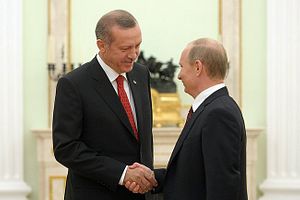The Rebalance author Mercy Kuo regularly engages subject-matter experts, policy practitioners, and strategic thinkers across the globe for their diverse insights into the U.S. rebalance to Asia. This conversation with Dr. Daniela Huber – Senior Fellow at the Istituto Affari Internazionale (IAI) in the Mediterranean and Middle East program and Gerda Henkel Research Fellow at LUISS University, author of Democracy Promotion and Foreign Policy: Identity and Interests in US, EU, and Non-Western Democracies (Palgrave 2015) and co-editor of Arab Spring and Peripheries (Routledge 2016) – is the 60th in “The Rebalance Insight Series”.
Assess Turkey’s pivotal power play in the geopolitical intersections of Asia, Europe, and the Middle East.
Turkey’s pivotal role has always been evident for its Western partners at major turning points in history, such as the onset of the Cold War, its end, 9/11 and the invasion in Iraq in 2003, or the Arab uprisings. Seen from Turkey’s perspective, its own role conception in this respect has transformed over time. The end of the Cold War heralded in an activist foreign policy of Turkey as its immediate neighborhood disintegrated: states around Turkey collapsed and ethnic conflicts on the Balkans, in the Gulf, and in the Caucasus became unlocked. With the AKP [Justice and Development Party] entering power in the early 2000s, this activist foreign policy in Turkey’s neighborhood received a boost, focused on the concept of “zero problems with neighbors” to expand Turkey’s influence into its neighborhood. With the onset of the Arab uprisings, this foreign policy became increasingly unsustainable. Turkey sought to boost its role as a model for countries in transition and entered into confrontation with states such as Syria, post-coup Egypt, Israel, or Russia. As Ankara so became increasingly isolated, it is now changing course and returning to a more pragmatist foreign policy approach.
What are Ankara’s domestic challenges in the post-coup aftermath?
The recent coup in Turkey has, in contrast to previous coups in Turkey, been met with a strong response by Turkish civil and political society, which led to its failure and has shown the democratic potential of Turkish society. At the same time, the reaction of the government to the coup is witness to the latter’s insecurity and authoritarian potential. Strong cleavages in Turkish society continue to exist, among which the Kurdish question remains the most explosive and a key issue for Turkey’s stability. Another societal challenge Turkey has to deal with is the refugee issue which is also currently dominating its relationship to the European Union. Finally, some economic challenges remain and continuing the economic reform process is of utmost importance for the country.
What are Turkey’s strategic stakes in a scenario of a post-Bashar al-Assad-led Syria?
While a post-Bashar al-Assad-led Syria seems a currently rather unlikely scenario, Turkey clearly has important stakes in any post-Syrian Civil War scenario. It shares a long border with Syria, can control movements across this border to some degree, and has hosted parts of the Syrian opposition groups in its territory. It is a key destination of Syrian refugees – and is now also involved in managing the EU’s respective refugee crisis. Furthermore, the Kurdish question is deeply influenced by developments in both Syria and Turkey, and Turkey has an important role to play when it comes to the issue of Political Islam; at the onset of the Arab uprising, the AKP has been named as a model for other parties related to Political Islam, such as Ennahda in Tunisia or the Muslim Brotherhood in Egypt and Syria. To sum up, Turkey clearly is a key regional power alongside Iran, Saudi Arabia, and Russia which can determine the fate of any agreement that might be found for Syria.
With the restoration of relations with Israel, Egypt, and Russia, to what extent are Turkey’s economic and foreign policies intertwined?
The current restoration of relations with Israel, Egypt, and Russia has to be seen in the context of geopolitical developments rather than Turkey’s economic interests. Israel is a good example of this: as political relations with Israel hit rock bottom with the Mavi Marmara incident, economic relations continued and even increased after the crisis up until the recent reconciliation agreement. Thus, in this case economic policies were witness to a certain depth of the relationship between both countries that continues despite political difficulties. In the case of Russia, one can even speak of a certain level of interdependence in the area of energy with Russia being an important provider for Turkey, Turkey an important client for Russia. That provides a certain basis for relations between both countries but does not determine their ups and downs.
What three key priorities should the next U.S. president focus on in strengthening U.S.-Turkey relations?
The stability of Turkey in a disintegrating neighborhood is key for the stability of two key areas of U.S. interest, that is Europe on one side, and Iraq on the other. Turkey is a pivotal partner for both the U.S. and the EU as the Middle East is transforming deeply. Thus, all following three priorities relate to the stability of Turkey and the necessity of further binding the country into the transatlantic partnership:
- Encourage the EU to anchor Turkey in a “differentiated Europe”,
- If TTIP will materialize, bind Turkey into the agreement on favorable terms for all three actors involved,
- Strengthen the security partnership with Turkey through NATO and beyond.

































